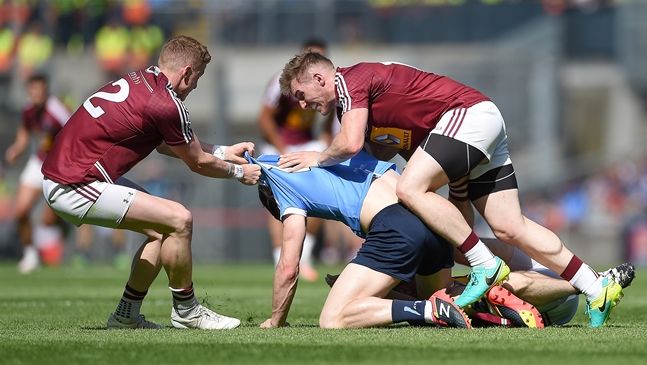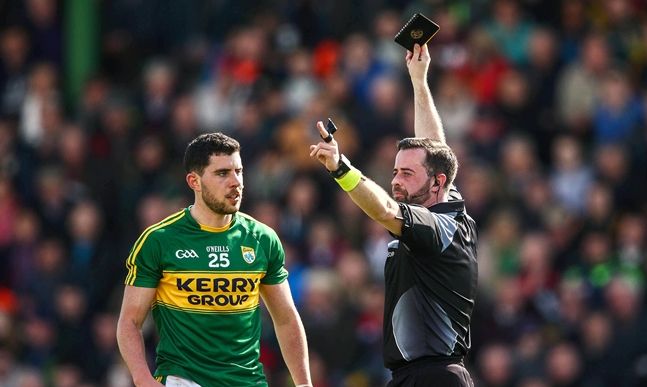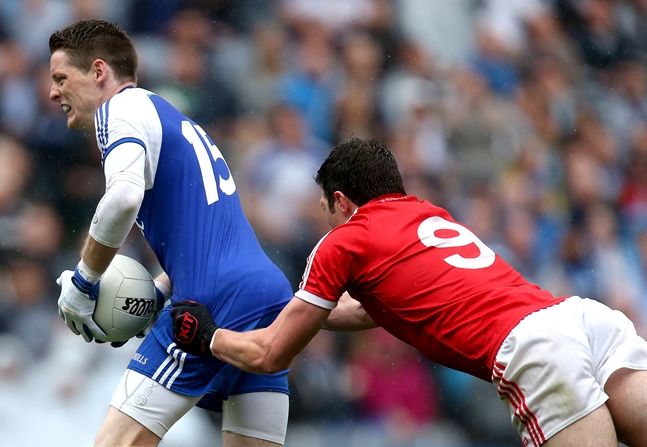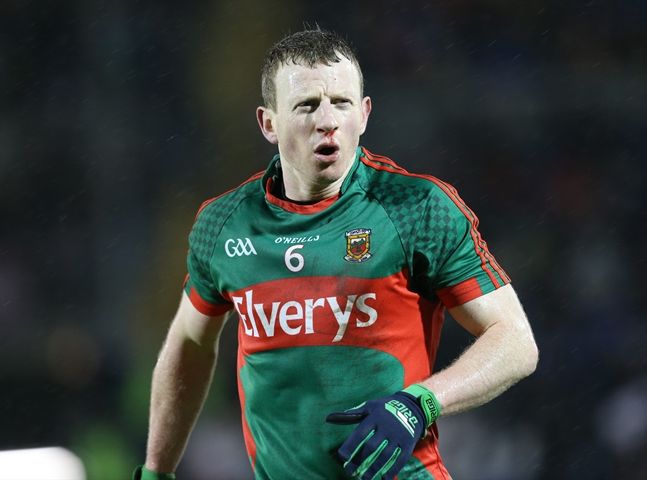It’s that time of year again.
Defensive football has been slated, competition structures looked at and now we’re onto the black card.
Two dismissals of Tyrone players during the Ulster final has brought the card back into the spotlight and its purpose and application are all being debated yet again.
The question begs though, if people like Mattie Donnelly are being sent off in the first half of provincial deciders for what looked to be a very harsh ruling, is it time to get rid of the black card?
Conán Doherty says: NO
Don’t blame the black card, blame those enforcing it the wrong way.
Not just the referees – their superiors, the supporters, the analysts in the studio who have the benefit of hindsight and replays.
It was bad enough on Sunday that Spillane and O’Rourke were agreeing at half time that Mattie Donnelly and Cathal McShane deserved to go during the Ulster final but, later that night, The Sunday Game highlights show featured three recently retired top inter-county footballers and they unanimously suggested that Diarmuid Connolly should’ve been black-carded for his altercation in the Westmeath match.

Why? Because it was a pull-down.
Okay, that’s in the rule book but for God’s sake the ball was dead, play had stopped and the black card was brought in to stop cynical play, not to pointlessly end someone’s game for no real reason.
That supposedly measured interpretation is way worse than referees’ inconsistencies. A lot of people have lost sight of why the black card was introduced in the first place and it’s all you hear in the crowd nowadays, “black card!”.
Of course, referees’ inconsistencies is bloody frustrating too.

Since the introduction of the rule, yellow cards have never been more popular. Refs look at the occasion and the player when they’re weighing up punishing an offender like he should be punished. Then, when it’s an innocuous incident, when it’s completely unnecessary, the card is produced and games are ruined.
They’re not getting it right, they’re not using common sense and neither are a lot of pundits. That’s not a problem with the card. It’s a problem with its application.
Everyone says that the rules need to be clearer, that there should be more awareness around what it’s for. It’s as simple as this: get rid of the verbal abuse element and, if we’re so obsessed with following it to the very letter, add in to the ruling that those pull-downs and trips relate only to cynical play – a professional foul as our cross-channel cousins would say.
If someone’s deliberately stopped another player from going through on goal or getting a shot away or getting into a better attacking position, then it’s a black card. Anything else is as you were.
We don’t need to get rid of the card altogether for that bit of logic to prevail. Just get rid of the nonsense talk surrounding it.
Conor Heneghan says: YES
When an issue like the black card continues to attract the level of uproar it did after the weekend, more than two years after it was introduced, then it’s clear that there’s something amiss.
Just so I’m clear about this; I don’t belong in the category of those who want the black card abolished and for Gaelic Football to return to how it once was.
We all know why it was introduced in the first place. Tactical fouling and cynical play had become a blight on the game, reaching a nadir when Sean Cavanagh dragged Conor McManus down on the edge of the square in Croke Park to assure Tyrone’s passage to the 2013 All-Ireland semi-final.

If the black card was abolished without any replacement, then the use of the same underhand tactics would return immediately. So, remove it, but replace it with something that’s easier to understand, easier to implement and continues to punish the offenders.
The intentions behind the introduction of the black card were honourable and there are occasions that when it is used as it is intended, then it works. Of all the black cards issued last weekend, the most clear-cut of the lot was the one incurred by Colm Boyle in Mayo’s victory over Kildare.
With Fergal Conway bearing down on goal, Boyle intentionally wrapped him up and dragged him to the ground. He knew exactly what he was doing and was on his way off the pitch before the black card was even brandished in his direction. No arguments.
The unfortunate thing, however, is that it’s rarely as simple as that. In my opinion, neither of the black cards issued to Tyrone players during the Ulster Final were black cards.
Mattie Donnelly had too much forward momentum to describe his tackle as a deliberate body collide with Eoin McHugh. A yellow card, for sure, as it was a bit reckless, but definitely not black.
No way was that a black card for Mattie Donnelly. Crazy decision. Massive loss for Tyrone. Hugely disappointing for the player too. #GAA
— Barry Cahill (@barrycahilldub) July 17, 2016
If, as was reported by the BBC, that Cathal McShane verbally abused an umpire, then his black card was fair enough. If it was for a deliberate hand-trip, which is what was suggested by the television replays, then it absolutely shouldn’t have been a black card.
McShane, on the floor and surrounded by Donegal players, was clearly trying to protect himself and not trying to trip up a player located well over 100 yards from the opposition goal.
The problem with the black card, as illustrated in the Ulster Final is inconsistency and ambiguity. A yellow card offence in one game is a black card offence in another.
It frustrates fans no end so you can only imagine what it’s like for managers and the players themselves. Dick Clerkin’s comments might give you a fair idea.
Ahead of all the 'Black Card' debates later… I'm afraid to say 'I told you so' . A horrendous addition to our game #ulsterfinal
— D Clerkin (@clerkin_d) July 17, 2016
Don't be blaming the ref either… They don't implement half the stuff they should for that joke of a rule! #bintheblack #ulsterfinal
— D Clerkin (@clerkin_d) July 17, 2016
The repeated inconsistency suggests that even referees – and these are the top referees in the country we’re talking about – aren’t even sure how it’s meant to be implemented and if that is the case, then it is doomed.
Worse still, there have been repeated cases of referees using a yellow card as a get out of jail card when a player has clearly been guilty of a black card offence. Often in high-profile encounters too.
There are plenty of examples, but as an embittered Mayo man, Shane Enright escaping a black card (which would have led to his dismissal as he was already on a yellow) in the 2014 All-Ireland semi-final replay sticks out like a sore thumb.
The fact that the black card has been such a bone of contention so often in its brief life to date means that surely the GAA can revisit it and come up with something better.
For a start, the powers that be should be wondering whether the punishment is severe enough.
Mayo had the game won when Boyle committed his black card offence at the weekend, for example, but had Kildare been, say, four or five points down and the game still in the melting pot with 20 minutes left, is the removal of a player who can be replaced punishment enough?

In situations such as the Boyle one (I’m not picking on Colm Boyle here, there have been loads of others guilty of similar offences), players are actively encouraged to take a black card. And why wouldn’t they? As it stands, the risk to reward ratio is certainly in the offender’s favour.
But if blatant professional fouls were subject to harsher punishment that had a hugely detrimental effect on their team, would players be as quick to commit them?
A red card might be going too far, but the reintroduction of a sin-bin – supported by former referee Paddy Russell this week – is worth looking at again.
The sin-bin may or not be the answer, but the black card, it its current guise, should be thrown in an actual bin at this stage. The GAA can and must do better than this.















































